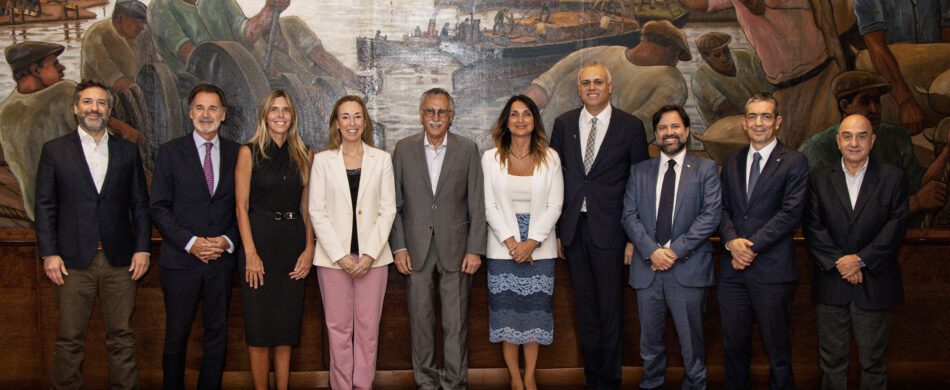PAHO, Argentina, Pfizer, and Sinergium drive local production of 20-valent pneumococcal vaccine for Latin America and the Caribbean
Countries in the region will have access to it at competitive prices through the PAHO Regional Revolving Funds

Authorities from the Ministry of Health of Argentina, PAHO, Pfizer, and Sinergium Biotech.
| Buenos Aires, January 15, 2025 (PAHO) — The Pan American Health Organization (PAHO), the Government of Argentina, Pfizer, and the pharmaceutical company Sinergium Biotech have announced a joint effort to facilitate local production and regional access to the 20-valent pneumococcal conjugate vaccine (PCV20). This vaccine will help reduce the burden of pneumococcal diseases, offering greater protection for vulnerable populations, including children and the elderly. “PAHO is committed to boosting regional production of sustainable, innovative technologies by strengthening existing capacities and our regional purchasing mechanism, the Revolving Fund for Access to Vaccines,” said PAHO Director Jarbas Barbosa. “This collaboration reflects our dedication to ensuring equitable access to safe, effective vaccines that prevent severe diseases and save lives,” he added. Through this initiative, not only will Argentina benefit from local production of the vaccine by Sinergium Biotech, but countries across the Region of the Americas will be able to access vaccine doses through PAHO’s Regional Revolving Funds, ensuring more rapid rollout of the vaccine at competitive prices. Vaccines PCV10 and PCV13 have had a positive impact on the health of children in Latin America and the Caribbean. Estimates from a 2016 study on the global burden of lower respiratory tract infections showed that following the introduction of these vaccines, cases of invasive pneumococcal disease (IPD) in children under the age of 5 years, caused by the vaccine-covered serotypes, were significantly reduced. However, an increase in infections caused by other, non-vaccine-covered serotypes was observed. PCV20, which includes seven additional serotypes compared to PCV13, is expected to further increase protection against severe diseases caused by Streptococcus pneumoniae (pneumococcus), responsible for pneumonia, meningitis, and other serious infections, including those linked to antibiotic-resistant strains. Pneumococcal disease remains a global public health problem. According to global estimates by the Institute of Health Metrics and Evaluations (IHME) in 2021, 155,000 children under the age of 5 died due to pneumonia and meningitis caused by pneumococcus. Of these deaths, 3,345 occurred in Latin America and the Caribbean. During the same year, pneumococcal disease caused around 243,000 deaths in adults aged 70 and older, including 18,000 deaths in Latin America and the Caribbean. The PCV20 vaccine will be available to Latin America and the Caribbean starting in early 2025. It is estimated that the first doses produced in Argentina will be available by 2026. This vaccine, recommended for children under two and adults over 60, is already being introduced in high-income countries and will also be accessible to countries in the region. For over 40 years, PAHO’s Revolving Fund for Access to Vaccines has enabled countries in the region to make joint vaccine purchases, giving them bargaining power and ensuring competitive pricing, regardless of each country’s individual demand. With PCV20, countries will also be able to purchase the vaccine at a favorable price, and shipments will be regional, reducing both costs and the carbon footprint. Another benefit of the vaccine, compared to PCV13, is that it will be delivered in prefilled syringes, simplifying the administration process at point of care. By contributing to the development of an ecosystem for large-scale vaccine production and distribution, the effort will help to increase the region’s resilience to future pandemics and outbreaks—one of the key lessons learned from the COVID-19 pandemic. |
| Links Regional Revolving Funds |
The Pan American Health Organization (PAHO) works with the countries of the Americas to improve the health and quality of life of its population. Founded in 1902, it is the world’s oldest international public health agency. It serves as the Regional Office of WHO for the Americas and is the specialized health agency of the Inter-American system (OAS).
Copyright © 2025 Pan American Health Organization, All rights reserved.






1 COMMENTS